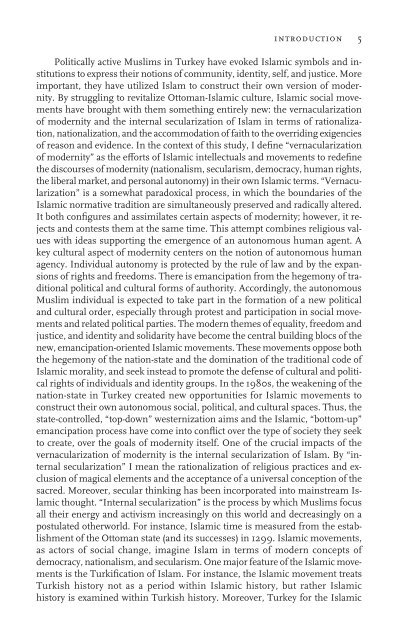You also want an ePaper? Increase the reach of your titles
YUMPU automatically turns print PDFs into web optimized ePapers that Google loves.
<strong>in</strong>troduction 5<strong>Political</strong>ly active Muslims <strong>in</strong> <strong>Turkey</strong> have evoked <strong>Islamic</strong> symbols and <strong>in</strong>stitutionsto express their notions of community, identity, self, and justice. Moreimportant, they have utilized Islam to construct their own version of modernity.By struggl<strong>in</strong>g to revitalize Ottoman-<strong>Islamic</strong> culture, <strong>Islamic</strong> social movementshave brought with them someth<strong>in</strong>g entirely new: the vernacularizationof modernity and the <strong>in</strong>ternal secularization of Islam <strong>in</strong> terms of rationalization,nationalization, and the accommodation of faith to the overrid<strong>in</strong>g exigenciesof reason and evidence. In the context of this study, I deWne “vernacularizationof modernity” as the eVorts of <strong>Islamic</strong> <strong>in</strong>tellectuals and movements to redeWnethe discourses of modernity (nationalism, secularism, democracy, human rights,the liberal market, and personal autonomy) <strong>in</strong> their own <strong>Islamic</strong> terms. “Vernacularization”is a somewhat paradoxical process, <strong>in</strong> which the boundaries of the<strong>Islamic</strong> normative tradition are simultaneously preserved and radically altered.It both conWgures and assimilates certa<strong>in</strong> aspects of modernity; however, it rejectsand contests them at the same time. This attempt comb<strong>in</strong>es religious valueswith ideas support<strong>in</strong>g the emergence of an autonomous human agent. Akey cultural aspect of modernity centers on the notion of autonomous humanagency. Individual autonomy is protected by the rule of law and by the expansionsof rights and freedoms. There is emancipation from the hegemony of traditionalpolitical and cultural forms of authority. Accord<strong>in</strong>gly, the autonomousMuslim <strong>in</strong>dividual is expected to take part <strong>in</strong> the formation of a new politicaland cultural order, especially through protest and participation <strong>in</strong> social movementsand related political parties. The modern themes of equality, freedom andjustice, and identity and solidarity have become the central build<strong>in</strong>g blocs of thenew, emancipation-oriented <strong>Islamic</strong> movements. These movements oppose boththe hegemony of the nation-state and the dom<strong>in</strong>ation of the traditional code of<strong>Islamic</strong> morality, and seek <strong>in</strong>stead to promote the defense of cultural and politicalrights of <strong>in</strong>dividuals and identity groups. In the 1980s, the weaken<strong>in</strong>g of thenation-state <strong>in</strong> <strong>Turkey</strong> created new opportunities for <strong>Islamic</strong> movements toconstruct their own autonomous social, political, and cultural spaces. Thus, thestate-controlled, “top-down” westernization aims and the <strong>Islamic</strong>, “bottom-up”emancipation process have come <strong>in</strong>to conXict over the type of society they seekto create, over the goals of modernity itself. One of the crucial impacts of thevernacularization of modernity is the <strong>in</strong>ternal secularization of Islam. By “<strong>in</strong>ternalsecularization” I mean the rationalization of religious practices and exclusionof magical elements and the acceptance of a universal conception of thesacred. Moreover, secular th<strong>in</strong>k<strong>in</strong>g has been <strong>in</strong>corporated <strong>in</strong>to ma<strong>in</strong>stream <strong>Islamic</strong>thought. “Internal secularization” is the process by which Muslims focusall their energy and activism <strong>in</strong>creas<strong>in</strong>gly on this world and decreas<strong>in</strong>gly on apostulated otherworld. For <strong>in</strong>stance, <strong>Islamic</strong> time is measured from the establishmentof the Ottoman state (and its successes) <strong>in</strong> 1299. <strong>Islamic</strong> movements,as actors of social change, imag<strong>in</strong>e Islam <strong>in</strong> terms of modern concepts ofdemocracy, nationalism, and secularism. One major feature of the <strong>Islamic</strong> movementsis the TurkiWcation of Islam. For <strong>in</strong>stance, the <strong>Islamic</strong> movement treatsTurkish history not as a period with<strong>in</strong> <strong>Islamic</strong> history, but rather <strong>Islamic</strong>history is exam<strong>in</strong>ed with<strong>in</strong> Turkish history. Moreover, <strong>Turkey</strong> for the <strong>Islamic</strong>




